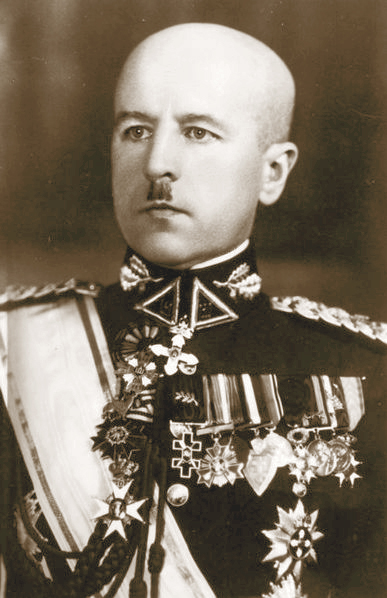Stasys Raštikis
 Stasys Raštikis (September 13, 1896 – May 3, 1985) was a Lithuanian military officer, ultimately obtaining the rank of divisional general. He was the commander of the Lithuanian Army from September 21, 1934, to April 23, 1940.
Stasys Raštikis (September 13, 1896 – May 3, 1985) was a Lithuanian military officer, ultimately obtaining the rank of divisional general. He was the commander of the Lithuanian Army from September 21, 1934, to April 23, 1940.During World War I, he served in the Imperial Russian Army mostly in the Caucasus Campaign. After return to Lithuania in 1918, he joined the newly formed Lithuanian Army and fought in the Lithuanian–Soviet War. He was severely injured and spent 20 months in Soviet captivity. He returned to the 5th Infantry Regiment and later joined the Intelligence Department of the General Staff. The coup d'état of December 1926 brought his future wife's uncle, Antanas Smetona, to power, which propelled his career. Raštikis completed military education in Germany and, after the failed military coup in 1934, became Chief of the General Staff and Commander of the Armed Forces. He undertook an extensive military reform to standardize, streamline, and modernize the army during the period of increasing militarization and rising tensions in Europe. He placed particular attention on soldiers' and officers' education, organizing and personally commanding various military exercises.
Raštikis attempted to distance himself and the army from politics and did not support the ruling Lithuanian Nationalist Union. After the Polish ultimatum of March 1938, Raštikis became Minister of Defense and was increasingly drawn into the political arena. He was a negotiator of the Soviet–Lithuanian Mutual Assistance Treaty by which Lithuania regained a portion of the Vilnius Region but virtually sacrificed its independence. A conflict with Prime Minister Antanas Merkys led to Raštikis' resignation in April 1940. When the Soviet Union presented its ultimatum in June 1940, he was briefly considered for prime minister in the new pro-Soviet People's Government. Fearing arrest by the NKVD, Raštikis escaped to Nazi Germany.
Raštikis returned to Lithuania when Germany invaded the Soviet Union in June 1941. He was named Minister of Defense in the short-lived Provisional Government of Lithuania. However, it soon became clear that the Germans would not allow Lithuanian autonomy, and Raštikis obtained a job organizing army archives at the Lithuanian War Museum. Toward the end of the war, he retreated to Germany and emigrated to the United States in 1949. He taught Russian and Lithuanian languages at the Defense Language Institute in Monterey, California. Raštikis published a four-volume memoir. Provided by Wikipedia
